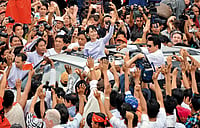There is an apocryphal story about how the late John Kenneth Galbraith, then US ambassador to India, would gift a pile of books to prime minister Indira Gandhi each time he met her. She finally put the eminent economist in his place by asking him, “Mr Ambassador, do you think I am uneducated?” It goes without saying that one should gift or recommend books with care or else one might be misunderstood.
In 1942, the BBC started one of its longest running radio programmes—Desert Island Discs. It still runs on BBC Radio 4. Famous guests are asked to choose eight pieces of music they would take with themselves if they were castaways on a desert island. They are also asked to choose a book and are usually gifted The Complete Works of Shakespeare or the Holy Bible. With no access to Rahul Gandhi or the notional island where he is spending his sabbatical, might it be a good idea to imagine the books which might stimulate fruitful introspection? This writer suggests an eclectic selection of four short books.
Rahul might begin by trying to understand what passion for politics means with George Orwell’s Homage to Catalonia. It is a record of idealist youth fighting totalitarianism in Spain at a time when fascism was making early gains in Europe. There are no direct parallels between the Spain of the 1930s, where Orwell joined the Republican forces, and today’s India. However, there is a sharp rise in social intolerance and proto-fascist organisations in the country have been emboldened. At the same time, there also exists a wave of idealism cutting across age, caste, community and religion, as the Delhi victory of the Aam Aadmi Party shows. If his eyes do not water on reading the book and he does not feel elated by the idealism of youth fighting the rise of fascism, he should probably consider retiring from politics. He might then turn to a longish essay by Bernard Crick—In Defence of Politics, published in 1962. Crick, a British professor of political science, has also written a brilliant biography of George Orwell. In Defence of Politics is where he asserts the importance of politics and its nobility as a vocation at a time when people were getting impatient with politics and politicians.
Crick begins by quoting a lead article in The Times of November 16, 1961: “Who has not felt the distaste with democratic politics which Salazar [Portuguese dictator] expressed when he said that he ‘detested politics from the bottom of his heart; all those noisy and incoherent promises, the impossible demands, the hotchpotch of unfounded ideas and impractical plans...opportunism that cares neither for truth nor justice, the inglorious chase after unmerited fame, the unleashing of uncontrollable passions, the exploitation of the lowest instincts, the distortion of facts...all that futile and sterile fuss?’” And then Crick goes on to restore the confidence of his readers in “the virtues of politics as a great civilising activity” and argues how those who couldn’t be bothered by politics become the unwitting allies of those with extremist political agendas. At less than 200 pages, it is an inspiring read for anyone who believes in democracy, and Rahul would enjoy the book.
The next book he might like to pick up is Benedict Anderson’s slim volume, Imagined Communities—Reflections on the Origin and Spread of Nationalism. Anderson shows how the nation is a culturally constructed artefact built around ethnicity, race, religion and language, distinctly a product of modernisation and the availability of modern means of communication. It represents deep, horizontal affinity among citizens irrespective of the inequalities and exploitative relations that might exist between them.
Besides the sheer pleasure of reading it, the book might provide Rahul with a deeper understanding of how the Hindutva organisations—the essential support structures of the ruling BJP—espouse a very narrow and shrunken notion of Indian nationalism and the need to counter it.
Lastly, he might like a quick read of The Eighteenth Brumaire of Louis Bonaparte—as a framework for analysing politics in India. Although the monograph written by Karl Marx describes the destruction of the Second Republic in France and the assumption of dictatorial powers by Louis Bonaparte, it is a classic discussion of the role of the individual in politics. It describes the conditions in which a “mediocrity” in politics who pretends to be the benefactor of all can get cast as a hero.
Meanwhile, one wishes Rahul Gandhi happy reading. For more books, the young Gandhi would be better advised to consult wiser men and women. However, another sabbatical may not be coming any time soon.


























